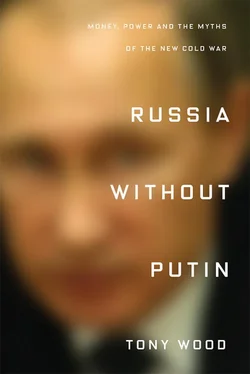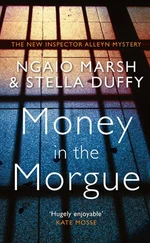The chapters that follow overturn each of these assumptions. Far from destroying the legacies of Yeltsin’s neoliberal restructuring, Putin in many crucial ways preserved and extended them. There are, to be sure, differences between the style and temperament of the two leaders, but there has been no fundamental change in the character of the system itself. Indeed, the 1990s and 2000s should be seen as two phases in the evolution of the same system: first, a turbulent period in which the Soviet order was destroyed and a new capitalist model installed – with enthusiastic backing from the West – followed by a period of stabilization and consolidation, as the new model sank its roots deep into the country’s socio-economic soil. Throughout, the system’s main priority has been to defend capitalism in Russia – if necessary at the expense of democracy, as the consistent resort to electoral rigging, from the 1990s to the present, demonstrates. The authoritarianism for which Putin is widely criticized is not the product of any sinister personal preference, but rather an integral feature of the system he inherited and has continued.
Much Western commentary since the mid-2000s has decried Russia’s apparent turn away from the free-market reforms of the 1990s toward a statism that has in practice tended to favour a select group at the top. Since 2014, many of these individuals, increasingly identified as ‘kleptocrats’, have been targeted by Western sanctions. Yet the corruption and rapacity of Russia’s current rulers is nothing new, nor is it confined to a small clique. Many of Putinism’s worst features are rooted in the socio-economic order that has been in place since the fall of Communism – embedded in the very form capitalism has taken in post-Soviet Russia. A closer look at the emergence and evolution of the Russian elite shows that power and wealth have been consistently interwoven since the USSR’s collapse. From the outset, the installation of capitalism in Russia was dependent on the deliberate political decisions of the state, which set about creating a class of wealth-owners by handing out pieces of the planned economy at absurdly low prices. After 2000, the terms of the relationship between the state and private wealth began to change, but the state’s commitment to the principle of private gain – and to the tremendous inequalities it generated – did not.
The weight of the Soviet past has repeatedly been invoked to explain the problems Russia faces in the present – from the authoritarian mind-set of the Putin government to endless bureaucracy to crumbling infrastructure. Behind this cliché lies the assumption that Russia’s transition to capitalism has been stalled or even reversed by the persistence of Communism’s legacies. This idea needs to be turned on its head: in the social realm, far from being an obstacle or burden, the Soviet past was a boon for Russia’s post-Soviet rulers. After the collapse of the USSR, Russian society underwent a wrenching transformation, as a new, market-driven system of class inequalities emerged from the ruins of Soviet-era hierarchies. These two structures, old and new, then existed in parallel. The persistence of Communist-era social infrastructure alongside the emergent capitalist system was in many cases what allowed ordinary Russians to survive the ‘transition’ of the 1990s – giving the market-based order critical breathing room and helping to muffle discontent. Yet this parallelism of old and new is by definition a temporary phenomenon, and the hidden subsidy provided to the present by the Soviet past will inevitably run out. When it does, Russia’s rulers may find themselves facing more unrest than they expected.
The protests of 2011–12 were the most serious internal challenge the Kremlin has faced this century, and were greeted in the Western media at the time as the ‘beginning of the end’ for Putin. Why did that hasty verdict prove so unfounded, and how do we explain the overall weakness of opposition movements in Russia today? The sheer power of the Kremlin relative to its opponents is certainly a major part of the answer. But the character of the opposition itself – its internal divisions and weaknesses – also played a role. If we look beyond the demonstrations of 2011–12, to the constellation of smaller protests that preceded and followed them, we can see a persistent gap between those calling for political reforms to the existing system and the broader, ideologically more diverse movements seeking to address the social consequences of Putin’s rule. Western coverage tends to focus on the problem of who might stand a chance of replacing Putin as president; in the past few years it has devoted a great deal of attention to anti-corruption campaigner Aleksei Navalnyi as a possible contender for the role. Yet any substantive change in the way Russia is ruled would involve much more than undoing Putin’s personal power. It would mean bridging the gap between the opposition movement’s political and social wings, in order to create a genuine alternative to the Putin system as a whole.
Heightened tensions within Russia have coincided with a dramatic worsening of relations with the West. This is often put down to an ingrained hostility to the West among Putin and the ruling elite, itself supposedly rooted in lingering Soviet-era prejudices. Yet a survey of Russia’s foreign policy since the fall of Communism reveals a different picture. For much of the post-Soviet era, the Russian elite – Putin very much included – were committed to an ideal of alliance or even integration with the West. Over time, however, it became increasingly clear that this was a one-sided fantasy, and Russia’s elite gradually abandoned it, swapping dreams of integration for a more strident defence of Russian interests.
This change in attitude did not take place because of any regression to Soviet thinking. It was driven, rather, by the underlying dynamic of relations between Russia and the West, which since the end of the Cold War have been characterized by a stark imbalance of power. Russia’s weakness after 1991 freed the West – the US in particular – to pursue its own strategic designs, foremost among them the expansion of NATO. In the face of Western dominance, Russia was compelled to accept these moves as faits accomplis . This profound asymmetry was always likely to generate resentment and tension, and sure enough, conflicts developed between Russia and the West over Kosovo in 1999 and 2007–08 and over Georgia in 2008. But it was only with the Ukraine crisis and annexation of Crimea in 2013–14 that Russia finally dropped the idea of alliance with the West – a development that places us on the other side of a major geopolitical watershed.
This has raised with renewed urgency the question of Russia’s place in the world. Now that the Russian fantasy of integration with the West has crumbled, the country once again finds itself confronting a series of large-scale dilemmas. Where is Russia going, and what role might it play in the twenty-first century? What are the internal dynamics and external forces that are likely to constrain its choices? Demographic trends – including substantial inward and outward migration as well as a simultaneous aging and dwindling of the population – and the economy’s increasing tilt toward natural-resource exports will reshape Russian society in complex and unpredictable ways. At the same time, the country faces a contentious and competitive global environment, in which it will likely occupy a less prosperous and prominent position. Yet it will, for all that, remain a significant player, with considerable resources at its disposal. Much hinges, in the end, on how it chooses to use them, and for whose benefit.
The answers to these questions depend in turn on the fate of the political system currently in place. Putin’s victory in the March 2018 presidential election was such a foregone conclusion that, long before the vote itself, many minds in Russia were already turning to 2024, when he will once again reach the constitutional limit of two consecutive terms. What, they wondered, will happen when he finally leaves office? Behind the question of Putin’s personal fate lies the larger issue of how the system he presides over will fare. Are his whims and personality so closely bound up with it that his departure would be enough to bring it tumbling to the ground?
Читать дальше












